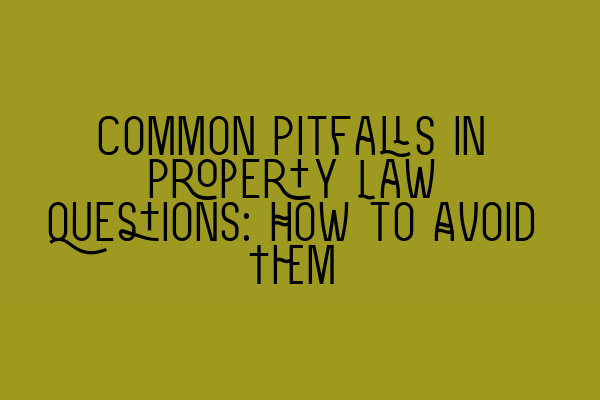At SQE Property Law & Land Law, we understand the intricacies of property law and the challenges it can present. As a solicitor preparing for the SQE exams or working in the field, it is important to be aware of the common pitfalls that can arise in property law questions and how to avoid them.
1. Failure to Read the Question Carefully
One of the most common pitfalls in property law questions is failing to read the question carefully. It is important to carefully analyze the facts presented in the question and identify the specific legal issues at hand. Pay close attention to the language used in the question, as it may provide clues as to the relevant legal principles that should be applied.
2. Insufficient Knowledge of Legal Principles
A thorough understanding of the legal principles underlying property law is essential to answering questions accurately. Without this knowledge, you may find it difficult to analyze the facts and apply the correct legal principles. Make sure to review and understand the relevant legal principles related to property law, such as the rights and obligations of landlords and tenants, the transfer of property, and the remedies available in case of breach.
3. Lack of Organization and Structure
Organizing your answer and presenting it in a logical, structured manner is crucial to effectively convey your understanding and analysis of the issues at hand. Start by providing a clear introduction, outlining the relevant legal principles that apply to the question. Then, systematically address each issue, using headings and subheadings to clearly demarcate your analysis. Conclude by summarizing your findings and offering any recommendations or solutions.
4. Failure to Provide Clear and Concise Explanations
When answering property law questions, it is important to provide clear and concise explanations of your analysis. Avoid using legal jargon or unnecessary technical terms that may confuse the reader. Instead, strive to explain your reasoning in simple and straightforward language, ensuring that your arguments are well-supported by relevant case law or statutory provisions.
5. Neglecting to Consider Practical Implications
While having a strong grasp of the legal principles is essential, it is equally important to consider the practical implications of your analysis. Property law often involves real-life situations, and it is crucial to understand how your legal analysis may impact the parties involved. Consider the potential consequences of your recommendations or solutions and address any practical challenges that may arise.
By being aware of these common pitfalls and taking steps to avoid them, you can enhance your performance in property law questions and showcase your expertise in the field.
For more information on related topics, we invite you to explore the following articles:
- Misrepresentation in Contracts: Unveiling Deceptive Practices
- SQE Contract Law: Analyzing Landmark Cases and Influential Judicial Decisions
- Understanding Contractual Capacity: Rights and Limitations
- Interactive SQE Mock Tests for Contract Law: Test Your Knowledge
- Join Our SQE Contract Law Webinars: Expert Insights and Guidance
At SQE Property Law & Land Law, we are committed to providing comprehensive resources and expert guidance to help you succeed in property law. Whether you are preparing for the SQE exams or seeking professional development in the field, our team is here to support you every step of the way.
